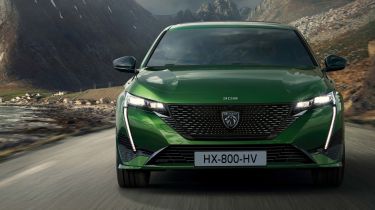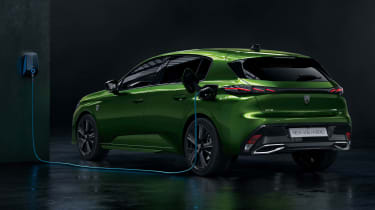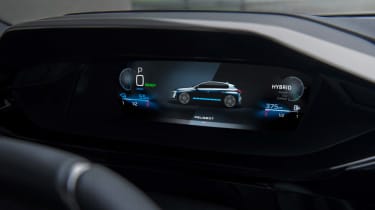New Peugeot 308 plug-in hybrid: prices, specs and on-sale date
Latest generation of popular family car gets plug-in hybrid version starting from £33,000, with first deliveries in December 2021

The new third-generation Peugeot 308 hatchback will start from £24,000 in petrol-engined form in the UK, with the line-up of plug-in hybrid versions being priced from £33,000, for the Hybrid 180 engine in Allure trim.
This is the first car to wear the brand's revamped logo, as well as the first 308 offered as a plug-in hybrid, rivalling the Volkswagen Golf GTE, SEAT Leon e-Hybrid, Skoda Octavia iV and Renault Megane E-TECH. It's 11mm longer overall than its predecessor and its wheelbase has been stretched by 55mm; it also looks sleeker than before thanks to a 20mm height reduction and longer bonnet.
The Hybrid 180 engine will cost £33,900 in Allure Premium trim and £35,800 in GT spec. GT is also where the more powerful Hybrid 225 engine becomes available, priced from £37,200. The hybrid 308 line-up is topped by the GT Premium, priced at £37,400 for the Hybrid 180 and £38,800 for the Hybrid 225.
New Peugeot 308 plug-in hybrid engines, electric range and performance
The less powerful 'Hybrid 180' combines a 148bhp PureTech petrol engine with a 110bhp electric motor and 12.4kWh battery for a total output of 178bhp and CO2 emissions of 25g/km. The more powerful 'Hybrid 225' option ups the engine power to 178bhp and overall output to 222bhp while retaining the same motor-and-battery combination. CO2 emissions here are 26g/km; both have an electric range of up to 39 miles.
Both also come with 3.7kW on-board chargers as standard; this can be upgraded to 7.4kW at extra cost to take advantage of the maximum charging speed of typical home wallbox chargers. Recharging the battery fully will take a shade under two hours at 7.4kW, a little under four hours at 3.7kW and just over seven hours from a standard domestic socket.
In addition to the two plug-in hybrid options, the new 308 will be available with conventional petrol and diesel power, comprising three 1.2-litre three-cylinder petrols of varying power outputs and a single 1.5-litre four-cylinder diesel.
Design, interior and practicality
Outside, the 308 sports Peugeot's latest design language, first seen on the facelifted 3008 family SUV. Slim LED headlights and a dramatic grille outline mark out the front end, while cameras and sensors for the car's driver-assistance systems have been integrated within the badge. Alloy wheels will be offered in sizes from 16 to 18 inches. Seven colour options will be offered initially.
Up front, the 308's seats promise comfort and a wide range of adjustment. They can optionally be equipped with 10-way electric adjustment, seat heating and an eight-pocket pneumatic massage system. In the back, the lengthened wheelbase should mean more leg and kneeroom for occupants, which was a weak point of the outgoing 308. Rear-seat passengers also get their own air vents, a pair of USB ports and a fold-down armrest with integrated cup-holders and a phone slot.
The new car has a 412-litre boot – one of the largest luggage spaces in the class – although that figure is likely to be smaller in the plug-in hybrid variants than it is in the petrols and diesels. Folding the rear seats folded down expands the available room to 1,312 litres, with the same caveat for the plug-ins as above.
On-board technology
Inside the new 308, there's a series of technology improvements, including Peugeot's 'i-Cockpit' digital dials and a new infotainment system known as 'i-Connect Advanced', as well as eight colours of LED ambient lighting. The i-Cockpit 10-inch instrument cluster ahead of the steering wheel displays 3D graphics on higher trim levels, and can show information related to navigation, radio, media, driving aids and the engine's power flow.
Wireless Apple CarPlay and Android Auto connectivity is offered, as well as the option to simultaneously pair up to two phones for making and receiving calls using Bluetooth. Voice commands can also be issued to the car, using the waking phrase 'Okay, Peugeot'.
The steering wheel incorporates sensors that can detect your grip, while the wheel also has controls for many commonly used functions, such as radio, multimedia, phone and driver aids. The air vents have been placed high up on the dashboard, which Peugeot says is the best position for occupant comfort, while the 10-inch central infotainment screen below them is said to sit at the driver's hand level, for easier operation.
In place of physical air-conditioning controls, the 308 employs 'i-toggles' – these are touch-sensitive 'shortcut keys' that can be programmed to activate modes or functions that the driver specifies. The centre console, meanwhile, incorporates a wireless phone charging slot, two large cup-holders, two USB ports, an armrest and a 34-litre storage area.
The new 308 features a slew of advanced driver-assistance technology, including an optional 'Drive Assist 2.0' pack that brings semi-autonomous driving capability. This incorporates adaptive cruise control with a stop-and-go function, along with lane-keeping assistance, semi-automatic lane changes, anticipated speed recommendations and speed adaptation for corners.
Other technology available – either standard or as options – includes adaptive cruise control, automatic emergency braking, driver attention alerts, automatic high beams, traffic-sign recognition, long-range blind-spot monitoring, rear cross-traffic alert, a 180-degree reversing camera, 360-degree four-camera parking assistance and hands-free engine start.
Recommended
Most Popular

EV Deal of the Day: Dacia Spring is amazingly good value at £116 per month

EV Deal of the Day: budget-friendly Ford Capri for just £234 a month



